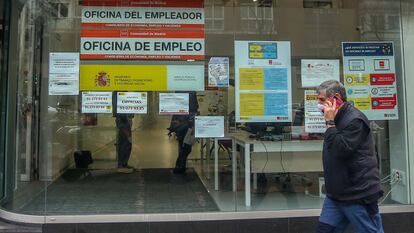Spain shed 218,953 jobs in January amid third wave of the pandemic
Registered unemployment reached over 3.9 million people while 738,969 workers were furloughed

The third wave of the coronavirus is already taking a toll on Spain’s job market. In January, 218,953 jobs were destroyed and 76,216 more people were out of work, according to figures released Tuesday by the Labor and Social Security ministries. Although the figures are in line with data reported throughout the pandemic, they suggest that the Spanish economy will continue to suffer, month after month, from the impact of the health crisis.
The number of people registered with Spain’s Social Security system, which is considered a measure of job creation, typically falls every January, as consumption slows and temporary contracts for the Christmas holiday period come to an end. In January 2020 – before the pandemic – Spain recorded its greatest fall in Social Security affiliations of that month since 2013, with 244,044 fewer contributors. This year was no different. Affiliations fell again in January 2021, but the drop was the fourth-smallest recorded since the financial crisis of 2008. What’s more, the total number of people registered with Social Security remains close to 19 million (18,829,480). In the last 12 months, however, affiliations have fallen by 335,015, a yearly drop of 1.75%.
But the statistics can be interpreted differently to reach other conclusions. For example, in the case of employment, if the number of Social Security affiliations from seasonal workers is left out (removing factors specific to different months, such as Christmas campaigns, the beginning of summer and national holidays), the results are more positive. In this scenario, the number of affiliations rose in January to 19,105,018, an increase of 39,814 with respect to December. Based solely on these numbers, affiliations of non-seasonal workers rose for the eighth consecutive month in January.
Improvement on 2020
According to the historical series, which began in 1997, registered unemployment has risen every January without exception. The biggest rise happened in 2009, when nearly 200,000 more people were out of work. This January, Spain saw its fourth-lowest rise since 2008, according to the Labor Ministry. The number of self-employed workers – another group that has been hit hard by the pandemic – also fell in January to 3,256,740, a drop of 14,688.

The total number of unemployed has been rising for the past four months. In the past year, jobless numbers have grown by 710,500, a rise of 21.8% compared to 2019. Disaggregated by sex, a higher percentage of women are out of work than men: 2,273,375 compared to 1,690,978.
Although the health impact of the coronavirus pandemic has been felt all over Spain, with contagions rising across the country, the economic impact of the pandemic has not been as uniform. While regions such as Galicia and the Balearic Islands reported a drop in unemployment (with 3,603 and 998 fewer people unemployed, respectively), the situation is very different in Andalusia, which recorded the highest rise in unemployment (with 18,249 more people unemployed), followed by Catalonia (10,470) and Valencia (10,094).
But a picture of the Spanish job market is not complete without considering the effects of the ERTE job retention schemes. Workers on an ERTE whose contracts are on hold or who are working reduced hours still count as affiliated with Social Security. The number of these furloughed workers reached 738,969 in January, a rise of 35,625 with respect to December. This figure represents 5.25% of all Social Security affiliations, not including self-employed workers. The Canary Islands is the region with the highest number of furloughed workers (84,403), followed by the Balearic Islands (33,156). Both regions depend heavily on the tourism industry, which has been devastated as a result of the coronavirus restrictions on travel.
Spain’s Labor Ministry said on Tuesday that unemployment spending reached €2.5 billion in December, of which €768 million went to paying furloughed workers.
English version by Melissa Kitson.
Tu suscripción se está usando en otro dispositivo
¿Quieres añadir otro usuario a tu suscripción?
Si continúas leyendo en este dispositivo, no se podrá leer en el otro.
FlechaTu suscripción se está usando en otro dispositivo y solo puedes acceder a EL PAÍS desde un dispositivo a la vez.
Si quieres compartir tu cuenta, cambia tu suscripción a la modalidad Premium, así podrás añadir otro usuario. Cada uno accederá con su propia cuenta de email, lo que os permitirá personalizar vuestra experiencia en EL PAÍS.
¿Tienes una suscripción de empresa? Accede aquí para contratar más cuentas.
En el caso de no saber quién está usando tu cuenta, te recomendamos cambiar tu contraseña aquí.
Si decides continuar compartiendo tu cuenta, este mensaje se mostrará en tu dispositivo y en el de la otra persona que está usando tu cuenta de forma indefinida, afectando a tu experiencia de lectura. Puedes consultar aquí los términos y condiciones de la suscripción digital.









































